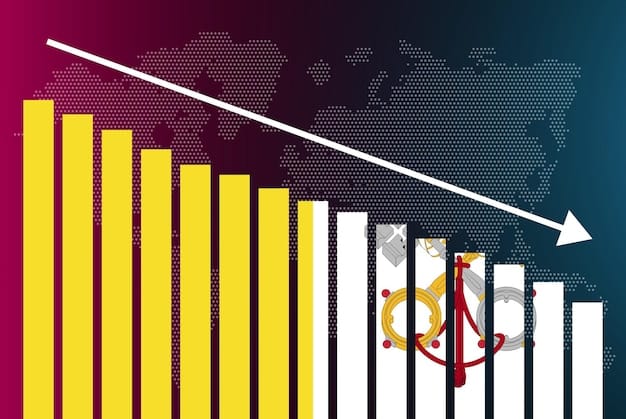Analyzing the Potential Impact of a Global Recession on the US Job Market

Analyzing the potential consequences of a global recession on the US job market involves understanding potential job losses, industry shifts, and the overall economic impact on employment rates and workforce stability across various sectors.
The global economy constantly faces uncertainties, and the looming threat of a recession can send ripples through the US job market. Understanding the potential impacts is crucial for businesses and individuals alike. This article analyzes the potential consequences of a global recession on the US job market, offering insights into what shifts to anticipate.
Understanding Global Recession Dynamics
A global recession is more than just a dip in economic activity; it’s a synchronized slowdown that impacts numerous countries simultaneously. Understanding the dynamics of such a recession is key to predicting its effect on the US job market.
This section explores the underlying factors and mechanisms that contribute to a global recession, providing a context for understanding its potential impact on the US.
Defining a Global Recession
A global recession is characterized by a significant decline in global economic activity lasting more than a few months. Key indicators include declines in GDP, trade, capital flows, and employment.
Factors Triggering Global Recessions
Multiple factors can trigger a global recession, including financial crises, trade wars, and unexpected shocks like pandemics. The interconnectedness of the global economy means that issues in one region can quickly spread.
- Financial Crises: Major disruptions in the financial sector can lead to credit freezes and economic contraction.
- Trade Wars: Escalating tariffs and trade restrictions can disrupt global supply chains and reduce overall economic output.
- Geopolitical Instability: Conflicts and political tensions can create uncertainty and negatively impact investment and growth.
Global recessions are complex events influenced by a variety of factors, making them challenging to predict and manage. Understanding these dynamics is essential for preparing for their potential impact on the US job market.

Impact on Key US Industries
A global recession doesn’t impact all industries uniformly. Somesectors are more vulnerable than others, and understanding these vulnerabilities can help predict job losses and shifts in demand. This section focuses on specific key US industries.
By understanding how these sectors historically respond to economic downturns, policymakers and businesses can better prepare for the potential impact of a global recession.
Manufacturing
The manufacturing sector is often one of the first to feel the effects of a recession. Decreased demand for goods leads to production cuts and potential layoffs.
Technology
While technology might seem recession-proof, certain segments, particularly those reliant on business spending, can suffer. A decrease in capital expenditure affects tech companies providing services to those businesses.
- Reduced IT Spending: Companies cut back on technology investments, affecting IT services and hardware manufacturers.
- Startup Funding Slowdown: Venture capital funding dries up, leading to layoffs in the startup sector.
- Decreased Consumer Spending: Lower consumer confidence leads to reduced spending on electronics and digital services.
The impact of a global recession can vary significantly across different US industries. Understanding these potential consequences is vital for formulating effective strategies to mitigate job losses and support economic stability.
Unemployment Rate Fluctuations
The unemployment rate is a key indicator of economic health, and it’s typically one of the most closely watched metrics during a recession. This section examines the potential impact of a global recession on the unemployment rate in the US.
Historical data and economic models can provide insights into how unemployment rates might fluctuate, offering a clearer picture of the challenges facing the US workforce.
Historical Trends
Historically, global recessions have led to significant spikes in the US unemployment rate. For example, during the 2008 financial crisis, unemployment soared to double digits.
Projected Unemployment Scenarios
Economic models can help project potential unemployment scenarios based on the severity of the global recession. These projections often consider factors like the depth and duration of the downturn.

Policy Responses and Mitigation Strategies
Government policies and mitigation strategies can play a crucial role in softening the blow of a global recession on the US job market. Effective policy responses can help stabilize the economy and support job creation.
This section examines potential policy measures and strategies that could be employed to mitigate the negative impacts of a global recession.
Fiscal Policies
Fiscal policies, such as stimulus packages and increased government spending, can boost demand and stimulate economic activity. These measures can help prevent large-scale layoffs and support businesses.
Monetary Policies
Monetary policies, like lowering interest rates, can make borrowing cheaper and encourage investment. This can provide a lifeline for businesses struggling with reduced revenue.
- Interest Rate Cuts: Lowering interest rates reduces borrowing costs for businesses and consumers.
- Quantitative Easing: Purchasing government bonds injects liquidity into the financial system.
- Forward Guidance: Communicating future policy intentions can help stabilize financial markets.
Effective policy responses are crucial for mitigating the negative impacts of a global recession on the US job market. Combining fiscal and monetary measures can provide a robust defense against economic downturns.
Long-Term Career and Skills Implications
A global recession can reshape the job market, leading to long-term implications for career paths and required skills. Adapting to these changes is essential for workers to remain competitive.
This section explores the potential long-term effects on career opportunities and the skills needed to navigate a changing job landscape.
Shift in Demand for Skills
Recessions often accelerate the shift towards automation and digitalization, increasing the demand for skills in areas like technology, data analysis, and online marketing.
Importance of Reskilling and Upskilling
Workers must invest in reskilling and upskilling to adapt to the changing demands of the job market. Online courses, vocational training, and apprenticeships can help individuals acquire new skills.
Preparing for Potential Job Market Turbulence
Given the potential risks, proactive preparation is essential for both individuals and businesses. This section outlines actionable steps to navigate potential job market turbulence caused by a global recession.
Implementing these strategies can help mitigate the impact of a downturn and position individuals and companies for future success.
For Individuals
Individuals can take several steps to prepare for potential job losses, including building an emergency fund, updating their resume, and networking with industry contacts.
For Businesses
Businesses can implement strategies to reduce costs, diversify revenue streams, and invest in employee training.
- Cost Reduction: Identify areas where expenses can be cut without affecting core operations.
- Diversification: Explore new markets and product offerings to reduce reliance on a single revenue stream.
- Employee Training: Invest in training programs to upskill employees and improve productivity.
Preparing for potential job market turbulence caused by a global recession requires proactive measures from both individuals and businesses. These strategies can help mitigate risks and ensure long-term stability.
| Key Point | Brief Description |
|---|---|
| 📉 Job Losses | Recessions typically lead to increased unemployment rates. |
| ⚙️ Industry Shifts | Some industries are more vulnerable and may face significant downturns. |
| 🛡️ Policy Responses | Government policies can mitigate the impact of a recession. |
| 🧰 Skills Adaptation | Workers need to adapt skills to remain competitive. |
[Frequently Asked Questions]
▼
A global recession is a significant decline in worldwide economic activity, typically marked by falling GDP, reduced trade, and rising unemployment rates across multiple countries.
▼
Industries like manufacturing, retail, and hospitality are generally more vulnerable, as they heavily rely on consumer spending and international trade, both of which tend to decline in recessions.
▼
The government can use fiscal policies such as stimulus packages and increased spending, along with monetary policies like lowering interest rates, to boost demand and support job creation.
▼
Skills in technology, data analysis, and digital marketing are likely to be in high demand, as companies focus on automation and online presence to adapt to changing market conditions.
▼
Individuals should build an emergency fund, update their resume, network with industry contacts, and consider upskilling or reskilling to enhance their employability in a competitive market.
Conclusion
Analyzing the potential consequences of a global recession on the US job market reveals a complex interplay of factors. While challenges are inevitable, understanding these dynamics and implementing proactive strategies can help mitigate the negative impacts and foster greater resilience. The key lies in preparedness, adaptability, and informed decision-making at both the individual and policy levels.





